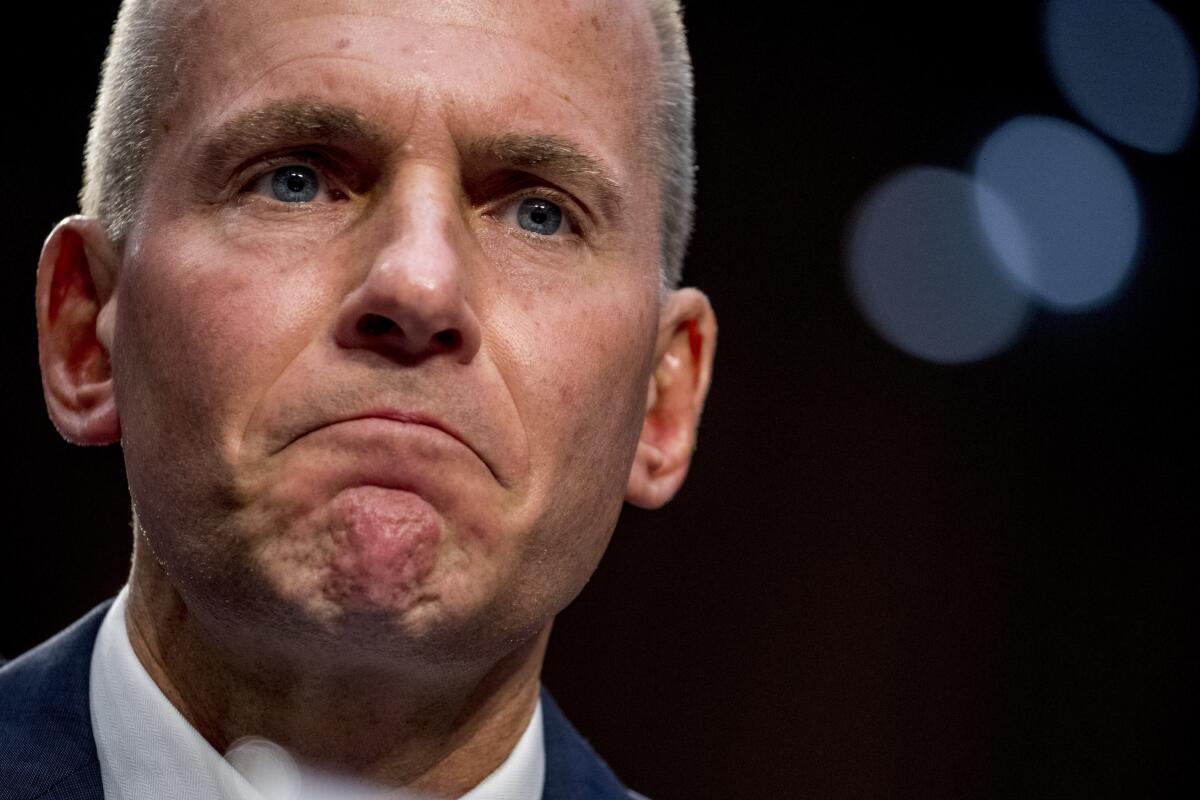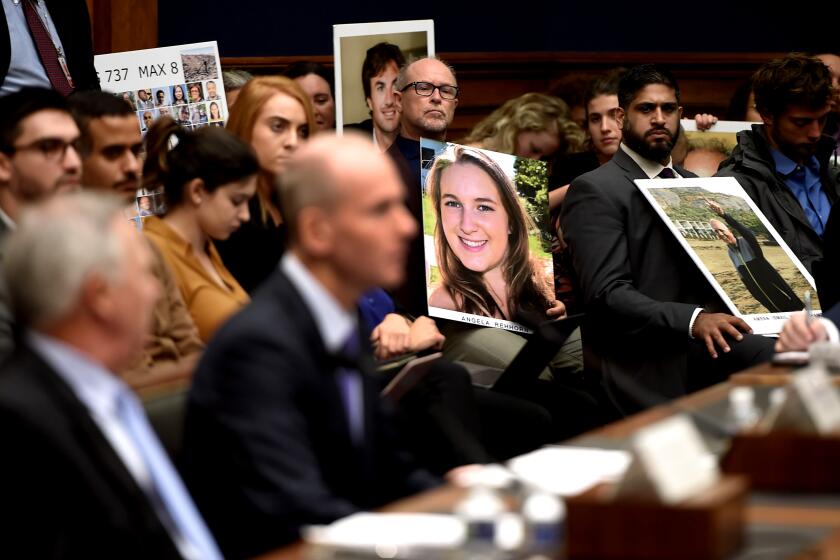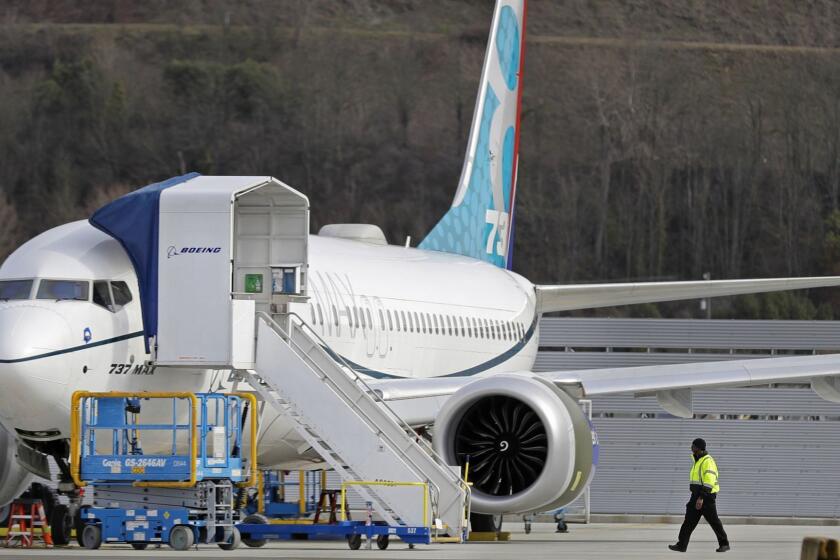Boeing CEO chastised by FAA chief as American pushes off return of the 737 Max

- Share via
The nation’s top aviation regulator took Boeing Co.’s chief to the woodshed Thursday in a sign that relations between the two sides have deteriorated and further delays in the return to service of the plane maker’s top-selling jet are likely.
In an unusual public admonishment, Federal Aviation Administration head Steve Dickson presented Boeing Chief Executive Dennis Muilenburg and Executive Vice President for Commercial Airplanes Stan Deal with a litany of grievances.
“The administrator recommended to Mr. Muilenburg that Boeing’s focus should be on the quality and timeliness of data submittals for FAA review,” the agency said in an email to lawmakers after the meeting. “He made clear that FAA’s certification requirements must be 100% complete before return to service.”
The meeting — called by the FAA to address what it said was Boeing’s unrealistic timetable for returning the 737 Max to service — was a sign of growing rancor between the two sides and came as skepticism grew that the plane would be able to resume flights soon. American Airlines Group Inc. announced Thursday that it was further delaying a return of the planes to its schedule and Southwest Airlines Co. is considering a similar move.
Boeing’s share price fell as much as 2.6% on Thursday before recovering. Shares were down 1% to $346.29 at the close of trading.
Delays in winning approval for fixes to the 737 Max have prompted Boeing to slow a planned increase in production.
Dickson was grilled for hours by the House Transportation and Infrastructure Committee on Wednesday over the FAA’s decision to allow the 737 Max to continue flying after the initial fatal crash off Indonesia involving the aircraft on Oct. 29, 2018. The plane was grounded after a second crash in Ethiopia on March 10. The crashes killed 346 people and have led to the longest U.S. airliner grounding in the jet age.
“I think Boeing doesn’t seem to realize the political realities of what’s happened and there’s a little institutional hubris still in play. They think they’re in the driver’s seat and they’re really not,” said Richard Aboulafia, vice president for analysis at Washington-based aerospace consultancy Teal Group. “The sound you hear in the background is everybody like me adding another month to the schedule.”
There have been signs for months that tension is growing between Boeing and the FAA, and in recent days officials hinted they may be eyeing an enforcement action against the Chicago-based plane maker.
The FAA has complained that Boeing’s projections of when it will return its grounded 737 Max to service are too optimistic and are an attempt to put pressure on the agency, according to an email to lawmakers sent Thursday before the meeting.
Afterward, the company said Muilenburg and Deal sought to reassure Dickson and said that they were committed to addressing “all the FAA’s questions.”
“We will work with the FAA to support their requirements and their timeline as we work to safely return the Max to service in 2020,” the company said in the statement.
A set of stairs may have never caused so much trouble in an aircraft.
Boeing is pushing back plans to increase production rates for the Max as the regulatory approval process drags on, according to a person familiar with the matter. The manufacturer, currently building 42 of the planes a month, expects to reach a rate of 57 a month in early 2021, several months beyond its previous plans for the end of 2020, said the person, who asked not to be identified.
“We will continue to assess production decisions based on the timing and conditions of return to service, which will be based on regulatory approvals and may vary by jurisdiction,” Boeing said in an emailed statement that didn’t address the specific schedule. “We continue to work closely with the FAA and global regulators towards certification and the safe return to service of the Max.”
Dickson had cautioned in an interview Wednesday on CNBC that the process to recertify the plane would extend into next year. Some people familiar with the list of items Boeing still has to complete don’t believe it will be accomplished until at least February. Boeing had said last month that it hoped to get approval for its software fixes by mid-December.
The meeting with the CEO was called to “ensure Boeing is clear on FAA’s expectations regarding the ongoing review of the 737 Max,” according to the FAA.
“The administrator is concerned that Boeing continues to pursue a return-to-service schedule that is not realistic due to delays that have accumulated for a variety of reasons,” the agency said. “More concerning, the administrator wants to directly address the perception that some of Boeing’s public statements have been designed to force FAA into taking quicker action.”
One of the most significant issues raised at the meeting involved Dickson urging Boeing to adopt better internal safety monitoring methods. The agency has required airlines to follow what is known as Safety Management System, but it’s not required for manufacturing and Boeing doesn’t have such a system.
“I’m glad to hear that,” Southwest Airlines CEO Gary Kelly said on learning of the Dickson-Muilenburg meeting. It’s good for them to coordinate with each other and other regulators, given the amount of work still to be done, Kelly said at an event in New York. Southwest is the biggest Max operator.
American Airlines said Thursday it was removing the 737 Max from its flight schedules through early April, more than a year since the jet was grounded worldwide after the deadly crashes.
Southwest probably won’t be able to use the plane by a planned date in early March if the flying ban isn’t lifted this month, Kelly said earlier Thursday.
The flying ban has cut Southwest’s operating income by $830 million this year, Kelly said in an interview.
More to Read
Inside the business of entertainment
The Wide Shot brings you news, analysis and insights on everything from streaming wars to production — and what it all means for the future.
You may occasionally receive promotional content from the Los Angeles Times.











